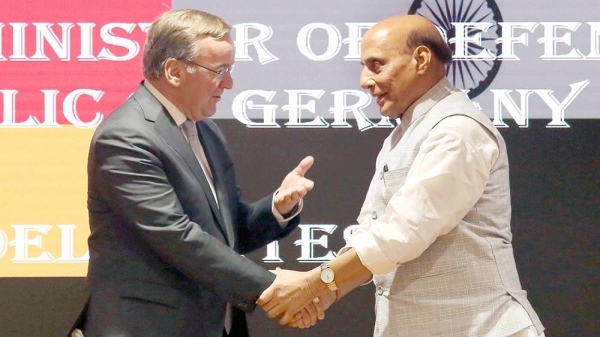
Germany on Tuesday pitched for building six advanced submarines in India under the government’s strategic partnership (SP) model, to boost the Indian Navy’s undersea strength, during talks, between India Defense Minister Rajnath Singh and his German counterpart Boris Pistorius.
The project, called P-75 India, is one of the biggest Make in India programs and is aimed at bolstering bilateral defense cooperation with a sharp focus on stronger industrial partnerships.
“The Germans are enthusiastic about their participation in the P-75I competition to build submarines in the country. The Indian side welcomed their participation,” said one of the officials, wishing not to be named.
Both leaders reviewed the ongoing bilateral defense cooperation and explored ways to strengthen collaboration, particularly in defense industrial partnerships, the Defense Ministry said in a statement.
Pistorius’s India visit is the first by a German defense minister in eight years. India cleared the estimated ₹43,000 crore project two years ago to strengthen the navy’s capabilities and provide momentum to the defense indigenization drive, one of the government’s key priorities.
India and Germany discussed the progress of a deal for the procurement of six advanced conventional submarines by the Indian Navy under Project-75I, Pistorius said on his talks with Singh while making a strong pitch for German company Thyssenkrupp Marine Systems (TKMS).
Seeking concrete cooperation projects, he said the submarine deal could become a “flagship project” while stating they want to intensify military cooperation with the other branches of the Navy and the Air Force as a whole.
On Tuesday, the two ministers held talks during which Singh called for German investments in Uttar Pradesh and Tamil Nadu defense corridors.
“We are talking about a deal by TKMS, about six submarines, but of course, the procedure is not finished yet but I think the German industry is at a good place in the race,” Pistorius said speaking to accompanying German media in Delhi.
“The German defense industry, especially manufacturers, has an excellent reputation. But, of course, there are competitors, and that’s no secret. And it will be a question of who will prevail. It’s the same with us. And the armaments companies too.”
Further, he said they support the “Make in India” initiative and it has to be organized in cooperation between companies on both sides.
“Of course, my role is not that I sign contracts or bring them with me, but that I say that we, as the federal government, support the work of our defense industry and we will continue to do so in the future,” he stated adding that his impression is that their position can be rated as quite promising.
The SP model envisages indigenous manufacturing of major defense platforms by an Indian strategic partner who will collaborate with a foreign original equipment manufacturer (OEM) to set up production facilities in the country.
In January 2020, the Defense Ministry cleared two Indian and five foreign shipbuilders, including German conglomerate TKMS, to take part in P-75I.
The Indian strategic partners cleared to collaborate with the foreign OEMs are Mazagon Dock Shipbuilders Limited and L&T. The foreign yards cleared for partnerships included the French Naval Group, Russia’s Rubin Design Bureau, Spain’s Navantia and South Korea’s Daewoo Shipbuilding & Marine Engineering Company.
A memorandum of understanding (MoU) is likely to be concluded by TKMS and state-run Mazagon Dock Shipbuilders during Pistorius’s visit to Mumbai on Wednesday, people familiar with the matter said. Such an agreement would be a step towards the two firms bidding for the multibillion-dollar submarine deal.
Submarines built under P-75I will be equipped with air independent propulsion (AIP) systems that will enable the vessels to stay underwater for longer periods and enhance their combat capabilities.
A minimum 45% indigenization has to be ensured by the strategic partner in P-75I in the first submarine, with the indigenous content going up to 60% in the sixth, the officials said.
The project will take time to mature. If all goes well after a contract is awarded to one of the contenders, the first submarine will be delivered to the navy only after a decade, the officials said.
The Indian navy plans to operate a fleet of 18 new conventional submarines and six nuclear-powered boats. The government approved the plan to build six nuclear-powered submarines in 2015, tweaking the 1999 submarine-building program. Also, it plans to operate a fleet of four nuclear-powered ballistic missile submarines.
In his talks with Pistorius, Singh highlighted new opportunities in the defense production sector, including the possibility of German investments in the country’s two defense industrial corridors in Uttar Pradesh and Tamil Nadu. The Indian defense industry could participate in the supply chains of German defense industry and add value to the ecosystem, besides contributing to supply chain resilience, the Ministry statement said.
Singh stressed “India and Germany could build a more symbiotic relationship based on shared goals and complementarity of strength, namely skilled workforce and competitive costs from India, and high technologies and investment from Germany,” it added.
The German minister arrived in India on a four-day visit on Tuesday. He laid a wreath at the National War Memorial and inspected a tri-service guard of honor. Later that day, Pistorius interacted with some Indian defense start-ups at Institute of Technology (IIT) Delhi, in an event organized by Innovations for Defense Excellence (iDEX).
“The event included a briefing on iDEX followed by showcasing of game-changing technologies by Indian start-ups on augmented reality/virtual reality, energy systems, smart drones and anti-drone systems, space propulsion systems and other allied technologies,” the Defense Ministry said.
The visiting minister was also briefed on the growth of India’s defense innovation ecosystem through the iDEX scheme and opportunities for collaboration in global emerging technology sectors.
Talking to German media on his discussions with Singh, Pistorius said they were in agreement about the German and European role in the Indo-Pacific. — Agencies












